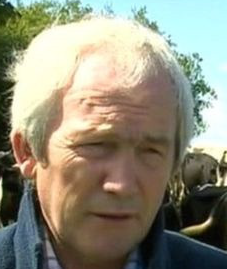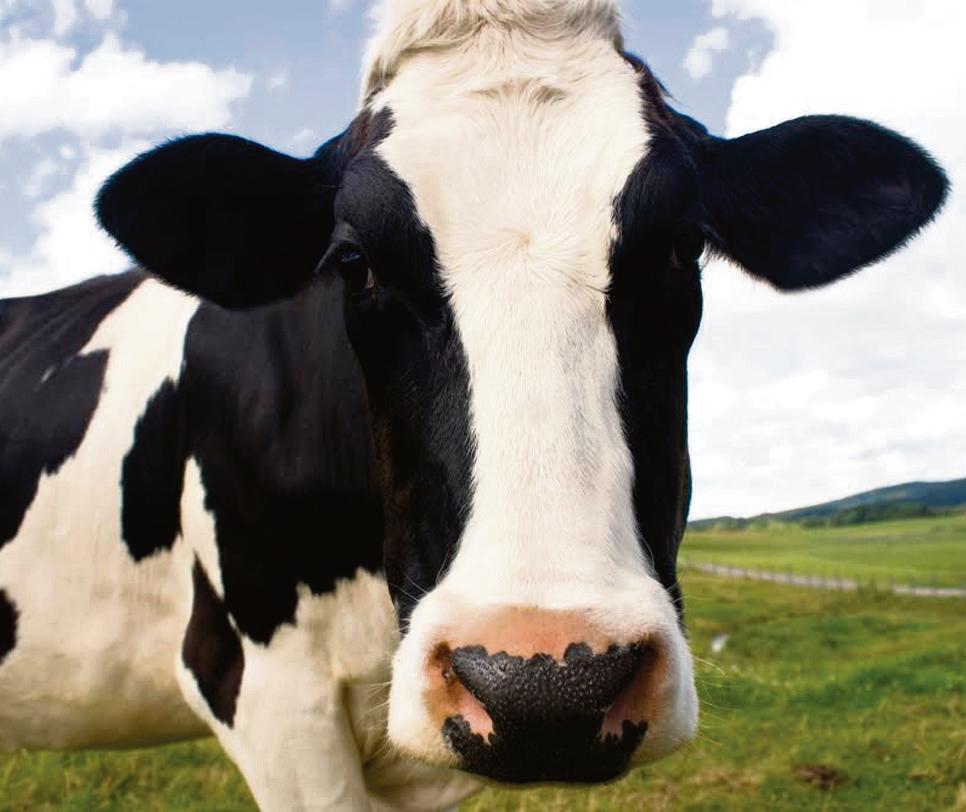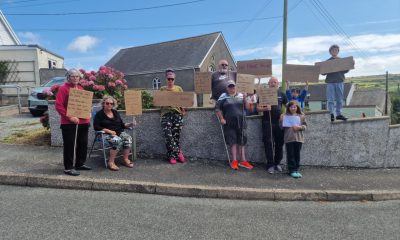Farming
NT claim ‘decades of damage’ to countryside


NFU Cymru President, Steven James: Countryside isn’t as damaged as National Trust insist
THE DIRECTOR GENERAL of the National Trust has called on government to put the recovery and future resilience of the natural environment at the heart of the funding system that will replace the Common Agricultural Policy (CAP).
Dame Helen Ghosh said reform was essential to reverse what she claimed were decades of damage to the countryside and the headlong decline of species.
Dame Helen told an audience at the National Trust Theatre at BBC Countryfile Live that the vote to leave the European Union presents an urgent opportunity to shape a new and better system for stewardship of the countryside.
She said:
“Whatever your view of Brexit, it gives us an opportunity to think again about how and why we use public money to create the countryside we want to hand on to future generations. Unless we make different choices, we will leave an environment that is less productive, less rich and less beautiful than that which we inherited.
“Taxpayers should only pay public subsidy to farmers in return for things that the market won’t pay for but are valued and needed by the public.
“We may need some kind of transition period to get there but that means payments for goods that go beyond food production – for the wildflowers, bees and butterflies that we love, for the farmland birds, now threatened, for the water meadows and meandering rivers that will help prevent the flooding of our towns, and for the rebuilding of the fertility and health of the soils on which both nature and production depend.
“In the long run, there’s no conflict between maintaining our ability to grow food and looking after the land and nature on which it depends. The first is utterly dependent on the second.
“This is not just about the subsidy system but the way the market works. Farmers should get a proper return from retailers and food manufacturers. If they are also producing clean water, unflooded streets or great holiday experiences, they should also get a proper return from the utilities or tourism industry.
“Farmers are key partners in finding solutions but this is too important to leave to governments and farmers to sort out between themselves.
“We would encourage ministers to now consult widely on the way we fund farming in a post-Brexit world and involve the public in the debate, along with organisations who have experience and insights to share.”
NFU Cymru President, Stephen James, said: “The picture the National Trust is trying to paint – that of a damaged countryside – is one that neither I nor most farmers, or visitors to the countryside, will recognise.
“Farmers manage 80% of Wales’ land area and through agri-environment schemes, such as Glastir, farmers continue to restore and establish new habitats for biodiversity. This includes over 310km of new streamside corridor; 265km of new or restored hedgerows and more and 20,000m2 of new ponds.
“Farmers take their responsibilities as custodians of the countryside seriously and most visitors to the countryside will be enjoying the natural environment and appreciating the views of rural Wales which have been created and maintained by farmers – including many of the landscapes showcased by the National Trust.
“In this debate we must not forget that food production is vital. We should not be contemplating doing anything which will undermine Welsh farming’s competitiveness or its ability to produce food. To do so would risk exporting food production out of Wales and for Wales to be a nation which relies even further on imports to feed itself.
“In our view, food security should be considered to be a legitimate political goal and public good. Welsh farmers are proud of the high standards of production, traceability of the food they produce and high animal welfare. Welsh food production is the bedrock of the food and drink sector – contributing £6.1 billion to the economy and employing 222,400 people.
“All our survey work shows that the Welsh public wants to buy more Welsh food and, interestingly, survey work also shows the Welsh public believes farmers play a beneficial role in improving the environment at the same time.”
Two of the largest beneficiaries of the current CAP regime are the National Trust, which receives £11m of subsidy each year, and the RSPB, with almost £7 million received in subsidy in 2015. Both organisations were vociferous campaigners against a reform of the CAP scheme in 2011, which would have seen them lose millions of pounds of subsidy and have their take from the scheme capped at £300K per year.
The extent to which the National Trust wants to see subsidy tied to the practices which would reap maximum benefit for itself from any subsidy system represents, potentially, special pleading by the organisation to ensure the best financial outcome for itself from any new subsidy scheme and puts down a marker as to what it would expect for itself out of such a scheme. The idea of a subsidy cut, such as that proposed by the EU in 2011, is evidently an unappealing one.
Moreover, Pillar 2 of CAP is for what’s vaguely known as ‘rural development’, which covers everything from preserving traditional farming practices and preventing the depopulation of the countryside to conservation and public access.
The Welsh Government has long taken an extraordinarily elastic view of the uses to which Pillar 2 funding can be put, and has used the payment scheme as a piggy bank to follow policies that are only connected tangentially to farming.
Farming
Welsh Conservatives warn climate plans could mean fewer livestock on Welsh farms

THE WELSH CONSERVATIVES have challenged the Welsh Government over climate change policies they say could lead to reductions in livestock numbers across Wales, raising concerns about the future of Welsh farming.
The row follows the Welsh Government’s decision, alongside Plaid Cymru and the Welsh Liberal Democrats, to support the UK Climate Change Committee’s Fourth Carbon Budget, which sets out the pathway towards Net Zero greenhouse gas emissions by 2050.
The Carbon Budget, produced by the independent Climate Change Committee (CCC), states that meeting Net Zero targets will require a reduction in agricultural emissions, including changes to land use and, in some scenarios, a reduction in livestock numbers.
During questioning in the Senedd, the Welsh Conservatives pressed the Deputy First Minister and Cabinet Secretary for Climate Change and Rural Affairs on whether the Welsh Government supports reducing livestock numbers as part of its climate strategy.
Speaking after the exchange, Welsh Conservative Shadow Cabinet Secretary for Rural Affairs, Samuel Kurtz MS, said the Welsh Government could not distance itself from the implications of the policy it had backed.
Mr Kurtz said: “By voting in favour of these climate change regulations, Labour, Plaid Cymru and the Liberal Democrats have signed up to the UK Climate Change Committee’s call to cut livestock numbers in Wales, and they cannot dodge that reality.
“The Deputy First Minister’s smoke-and-mirrors answers only confirm what farmers already fear: that Labour, along with their budget bedfellows in Plaid and the Lib Dems, are prepared to sacrifice Welsh agriculture in pursuit of climate targets.”
He added that the issue came at a time of growing pressure on the farming sector, pointing to uncertainty over the proposed Sustainable Farming Scheme, the ongoing failure to eradicate bovine TB, nitrogen pollution regulations under the Nitrate Vulnerable Zones (NVZs), and proposed changes to inheritance tax rules affecting family farms.
The Welsh Government has repeatedly said it does not have a target to forcibly reduce livestock numbers and has argued that future emissions reductions will come through a combination of improved farming practices, environmental land management, and changes in land use agreed with farmers.
Ministers have also said the Sustainable Farming Scheme, which is due to replace the Basic Payment Scheme, is intended to reward farmers for food production alongside environmental outcomes, rather than remove land from agriculture.
The UK Climate Change Committee, which advises governments across the UK, has stressed that its pathways are based on modelling rather than fixed quotas, and that devolved governments have flexibility in how targets are met.
However, farming unions and rural groups in Wales have warned that policies focused on emissions reduction risk undermining the viability of livestock farming, particularly in upland and marginal areas where alternatives to grazing are limited.
The debate highlights the growing tension between climate targets and food production in Wales, with livestock farming remaining a central part of the rural economy and Welsh cultural identity.
As discussions continue over the final shape of the Sustainable Farming Scheme and Wales’ long-term climate plans, pressure is mounting on the Welsh Government to reassure farmers that climate policy will not come at the expense of the sector’s survival.
Farming
FUW Insurance Services appoints Paul Jameson as non-executive director

Experienced insurance and risk specialist joins board as long-serving director retires
FUW INSURANCE SERVICS LTD, Wales’ leading specialist agricultural insurance broker, has announced the appointment of Dr Paul Jameson as a non-executive director.
Dr Jameson brings extensive experience in insurance and risk management, having worked as an actuary and senior executive within subsidiaries of major global insurers including Allianz, Munich Re, Legal & General and Wakam. He has held chief risk officer roles since 2020.
During his career, Dr Jameson has led multidisciplinary teams spanning actuarial services, risk management, compliance, audit, legal and marketing approvals, giving him broad experience in both strategic oversight and operational governance.
Speaking following his appointment, Dr Jameson, who lives in Colwyn Bay, North Wales, said he was looking forward to supporting the farming sector in Wales.
He said: “I am delighted to join FUW Insurance Services and would like to thank Ann, Guto and the rest of the team for their warm welcome.
“I have been impressed by the passion and commitment of the board to the farming community, and by its ambition to grow and diversify the insurance business. I am keen to support the farming profession and help ensure the continued success of the sector in Wales, particularly during periods of economic and geopolitical uncertainty.
“I hope my experience in the insurance sector will help the business build on its successes and continue to grow, especially as it explores new commercial opportunities and innovative avenues for expansion.”
Ann Beynon OBE, chair of the FUW Insurance Services board, said Dr Jameson’s expertise would be a significant asset to the organisation.
She said: “We are delighted to welcome Dr Paul Jameson to the board. His depth of experience in insurance and his understanding of risk management will be invaluable as we continue to develop and diversify our services.
“Paul’s insight and strategic perspective will help us navigate a changing insurance market, identify new opportunities for innovation and growth, and strengthen the services we provide to our customers.”
Dr Jameson’s appointment follows the retirement of Ken Isherwood, who has stepped down from the board after more than a decade of service.
Paying tribute, Ann Beynon said: “Ken’s integrity, wisdom and deep knowledge of the insurance industry have underpinned much of our success.
“It has been a privilege to work alongside him, and we wish him every happiness in his well-earned retirement.”
Community
Badger Trust launches manifesto ahead of 2026 Senedd elections

THE BADGER TRUST has published a new Cymru Badger Manifesto calling on candidates standing in the 2026 Senedd elections to commit to a science-led approach to bovine tuberculosis (bTB) and to maintain Wales’ current policy of not culling badgers.
The manifesto, released on Wednesday (Dec 10) as part of the charity’s Badgers Belong Here / Mae Moch Daear yn Perthyn Yma campaign, sets out the organisation’s position on badger protection, wildlife crime and bTB control, and urges politicians to reject calls for the reintroduction of culling in Wales.
Badger Trust argues that political decisions taken during the next Senedd term will be critical to the future of badgers, which it describes as culturally and ecologically significant to Wales. The charity says badgers have been present in Wales for more than 250,000 years and remain part of Welsh folklore, place names and rural identity.
Five key commitments
The manifesto outlines five commitments the charity is asking Senedd candidates to support, including defending what it describes as science-led policy on bTB, challenging misinformation in public debate, strengthening enforcement against wildlife crime, recognising badgers as part of Welsh heritage, and supporting local volunteer badger groups.
According to Badger Trust, 140 incidents of badger-related wildlife crime have been recorded in Wales since 2020, which it says highlights the need for improved reporting and enforcement.
The charity also points to the work of six active badger groups across Wales, which it says assist with rescuing injured animals, monitoring setts, recording road casualties and supporting local authorities.
bTB policy in Wales and England
Wales has not carried out widespread badger culling as part of its bTB control strategy, instead focusing on cattle testing, biosecurity measures and herd management.
Badger Trust claims that new herd incidents of bTB in Wales fell by more than 40% between 2010 and 2024, which it attributes to cattle-based controls rather than wildlife intervention.
The charity contrasts this with England, where it says almost 250,000 badgers have been culled over the past decade as part of bTB control programmes. It argues that bTB rates in England remain higher than in Wales and that the evidence does not show culling alone to be responsible for reductions in disease.
Disputed claims over culling
The manifesto challenges the frequently cited claim that badger culling in England led to a 56% reduction in bTB in cattle. Badger Trust says this figure has been misinterpreted and that studies cited in support of culling also involved additional measures such as enhanced cattle testing and biosecurity.
The charity points to statements from researchers and official correspondence which, it says, indicate that reductions in bTB cannot be attributed solely to culling.
Supporters of culling, including some farming groups, continue to argue that wildlife control should remain an option as part of a wider disease management strategy, particularly in areas with persistent infection. The Welsh Government has previously said it keeps its bTB policy under review in line with emerging evidence.
Call to candidates
Nigel Palmer, CEO of Badger Trust, said Wales demonstrated that bTB could be tackled without killing wildlife.
He said: “Wales is a world-leading example of how to address bovine TB through evidence-based policy. The progress made here shows that culling is not necessary, and we urge Senedd candidates to stand by the science.”
The manifesto is available in both Welsh and English and will be circulated to political parties and candidates ahead of the 2026 election.
-

 Crime4 days ago
Crime4 days agoMilford Haven man jailed after drunken attack on partner and police officers
-

 News7 days ago
News7 days agoDyfed-Powys Police launch major investigation after triple fatal crash
-

 Crime4 days ago
Crime4 days agoTeenager charged following rape allegation at Saundersfoot nightclub
-

 Crime5 days ago
Crime5 days agoMan charged with months of coercive control and assaults
-

 Crime5 days ago
Crime5 days agoMan sent to Crown Court over historic indecent assault allegations
-

 Crime5 days ago
Crime5 days agoMilford Haven man admits multiple offences after A477 incident
-

 Crime7 days ago
Crime7 days agoTrefin dog case ends in forfeiture order after protection notice breach
-

 Crime5 days ago
Crime5 days agoWoman ‘terrified in own home’ after ex breaches court order






















